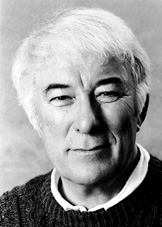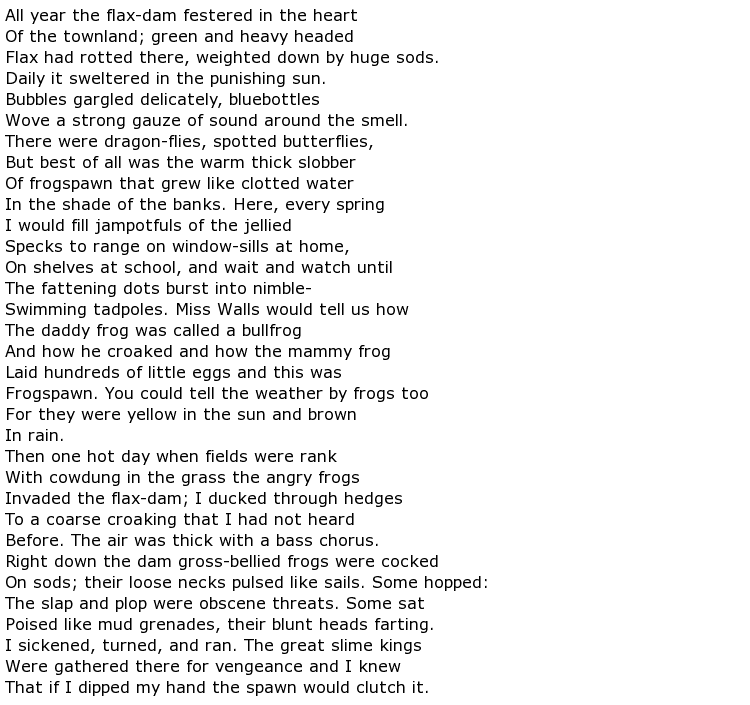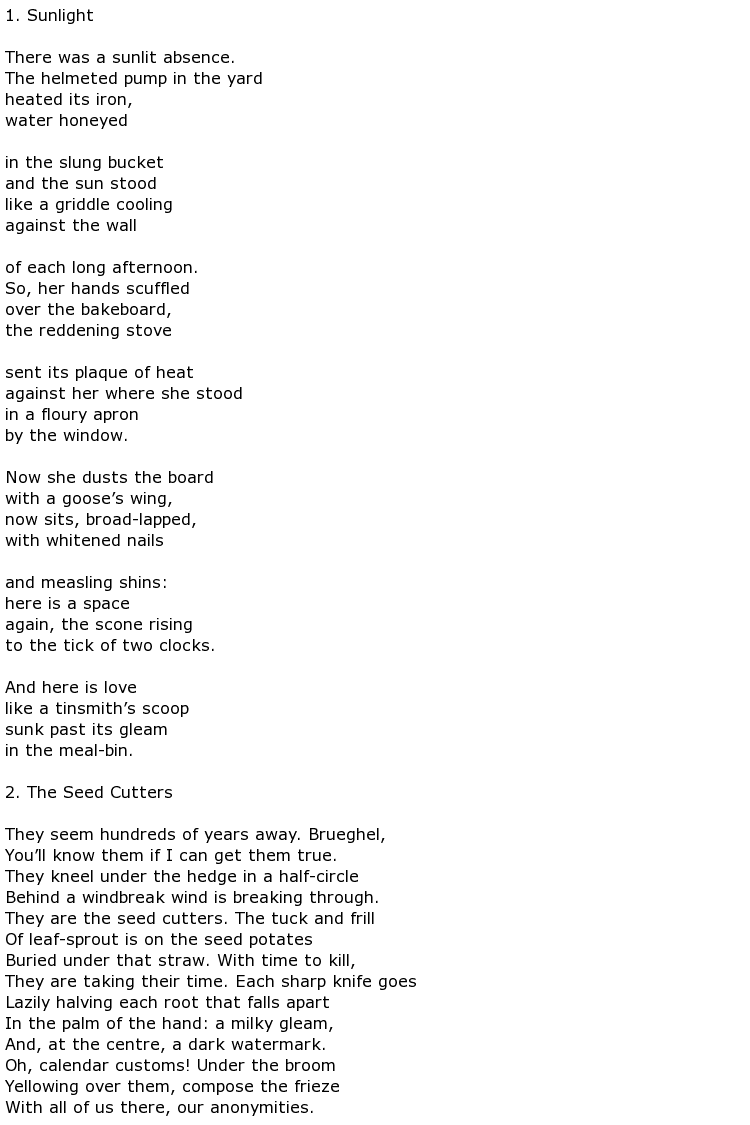 Seamus Heaney is an Irish-born writer, poet, and lecturer. Among his many awards, recognizing him for his outstanding poetry include the 1995 Nobel Peace Prize in Literature, the 2006 T. S. Eliot award, and the 1996 and 1999 Whitbread awards. He has been a professor at both Oxford and Harvard, teaching poetry, of course. Heaney, born in 1939, lived in Northern Ireland at the family farm known as Mossbown. It is located between Toomebridge aned Castledawson. Heaney was the eldest of nine brothers and sisters. His father was also from a large family (ten children in all) and was raised as a farmer; however, he was dedicated to dealing in cattle. Heaney’s mother came from a linen-milling background. Both of these backgrounds had a strong influence on Heaney’s early poetry, with both a traditional Gaelic, cattle herding past and an Ulster-setting based on the industrial revolution. As a young boy, he attended Anahorish Primary School, but then later was awarded a scholarship to St. Columb’s College, which was a large Catholic boarding school located in nearby Derry.
Seamus Heaney is an Irish-born writer, poet, and lecturer. Among his many awards, recognizing him for his outstanding poetry include the 1995 Nobel Peace Prize in Literature, the 2006 T. S. Eliot award, and the 1996 and 1999 Whitbread awards. He has been a professor at both Oxford and Harvard, teaching poetry, of course. Heaney, born in 1939, lived in Northern Ireland at the family farm known as Mossbown. It is located between Toomebridge aned Castledawson. Heaney was the eldest of nine brothers and sisters. His father was also from a large family (ten children in all) and was raised as a farmer; however, he was dedicated to dealing in cattle. Heaney’s mother came from a linen-milling background. Both of these backgrounds had a strong influence on Heaney’s early poetry, with both a traditional Gaelic, cattle herding past and an Ulster-setting based on the industrial revolution. As a young boy, he attended Anahorish Primary School, but then later was awarded a scholarship to St. Columb’s College, which was a large Catholic boarding school located in nearby Derry.
Death Of A Naturalist
by Seamus Heaney

Heaney’s writings generally focus on the surroundings he grew up with there in Northern Ireland. In particular, he noted that, although his experiences living in Derry County had been irrelevant and archaic compared to the contemporary world, it is there that he learned about trusting others. Many of his poems deal with the parochial, rural life of that region of Ireland. He also spends some time writing about some of the sectarian issues which permeated much of daily life in Northern Ireland throughout his lifetime there. His poetry concerning those troubled times were seen both as signs of hope and understanding, but also as bleak and deeply complex apologies for state of unrest. His poems tend to offer s historical framework and context in which these events were discussed.
Mossbawn: Two Poems in Dedication
by Seamus Heaney

Concerned with both English and his native Gaelic tongue, Heaney spent considerable time looking at the origins of words and how they have been used to express thoughts and ideas. He worked tirelessly with translations of original Gaelic writings into English. In particular, he has been praised for his work in translating the ancient Beowulf into contemporary English while still maintaining some sense of the original, ancient tones and moods. Much of his work is used in various college courses, both in Ireland and internationally. These works include a variety of poetic forms, including ballads, riddles, nonsense rhymes, rhythmical jingles and folk music. His poetry includes various language forms as well, such as Welsh, Irish, Scots and Scots Gaelic, English, and even some African-American influenced topics. Regardless of your background, most should find the writings of Seamus Heaney to be pleasant, inspirational, and well worth the time spent. His works offer a view into life in Northern Ireland, both in the rural and gentle lifestyles, as well as the more dramatic and disruptive world of internal struggles in Belfast and other locals.

